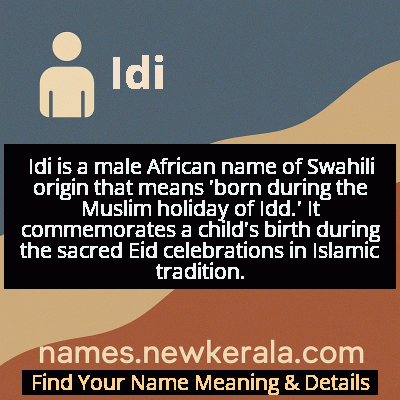Idi Name Meaning & Details
Origin, Popularity, Numerology Analysis & Name Meaning of Idi
Discover the origin, meaning, and cultural significance of the name IDI. Delve into its historical roots and explore the lasting impact it has had on communities and traditions.
Name
Idi
Gender
Male
Origin
African
Lucky Number
4
Meaning of the Name - Idi
Idi is a male African name of Swahili origin that means 'born during the Muslim holiday of Idd.' It commemorates a child's birth during the sacred Eid celebrations in Islamic tradition.
Idi - Complete Numerology Analysis
Your Numerology Number
Based on Pythagorean Numerology System
Ruling Planet
Uranus (Rahu)
Positive Nature
Strong sense of order, loyal, practical, and disciplined.
Negative Traits
Stubborn, overly serious, rigid, and prone to feeling restricted.
Lucky Colours
Blue, gray.
Lucky Days
Saturday.
Lucky Stones
Blue sapphire.
Harmony Numbers
1, 7, 8.
Best Suited Professions
Managers, engineers, accountants, organizers.
What People Like About You
Dependability, discipline, practicality.
Famous People Named Idi
Idi Amin
Military leader and politician
Third president of Uganda who ruled from 1971 to 1979
Idi Othman
Politician
Former Minister of State in Zanzibar's Revolutionary Government
Idi Gholzan
Academic and writer
Prominent Swahili scholar and cultural preservationist
Name Variations & International Equivalents
Click on blue names to explore their detailed meanings. Gray names with will be available soon.
Cultural & Historical Significance
Historically, the name has been prevalent in coastal regions of Tanzania, Kenya, and Uganda where Swahili culture and Islam have coexisted for centuries. It represents the fusion of Arabic Islamic traditions with Bantu linguistic elements, showcasing the rich cultural exchange that characterized the Indian Ocean trade routes. The name serves as a living testament to how religious observance and cultural identity intertwine in naming practices, with parents choosing Idi to honor both their faith and their child's unique entry into the world during spiritually significant times.
Extended Personality Analysis
Individuals named Idi are often perceived as having strong, charismatic personalities with natural leadership qualities. They tend to be confident, decisive, and ambitious, with a deep sense of cultural and religious identity that guides their actions. The celebratory origins of the name may contribute to a generally optimistic outlook and an ability to bring people together in social settings.
However, the name also carries expectations of responsibility and moral integrity, given its religious connotations. Idi's are often expected to demonstrate generosity, compassion, and community-mindedness—qualities associated with the Eid festivals from which the name derives. They may feel a sense of destiny or special purpose, knowing their name marks them as someone born during a sacred time. This can manifest as either positive leadership or, in some cases, excessive ambition, depending on individual character development and life experiences.
Modern Usage & Popularity
In contemporary times, the name Idi maintains its traditional usage among Muslim communities in East Africa, though its popularity has been influenced by historical associations. While it remains a meaningful choice for parents wanting to honor their child's birth during Eid celebrations, the name's usage has become more selective due to its association with prominent historical figures. In urban areas and among diaspora communities, some parents opt for variations like Iddi or combine it with other names to maintain the cultural connection while creating distinction. The name continues to be most popular in Tanzania and coastal Kenya, where Swahili naming traditions remain strong.
Symbolic & Spiritual Meanings
Symbolically, Idi represents celebration, renewal, and divine timing. The name carries the metaphorical weight of new beginnings, much like the Eid festivals that mark transitions in the Islamic calendar—from fasting to feasting, or from pilgrimage to spiritual renewal. It symbolizes being 'born at the right time,' suggesting a person destined for significance or blessed with good fortune. The name also embodies the concept of community and shared joy, as Eid celebrations are collective experiences that bring families and communities together in worship and festivity.

